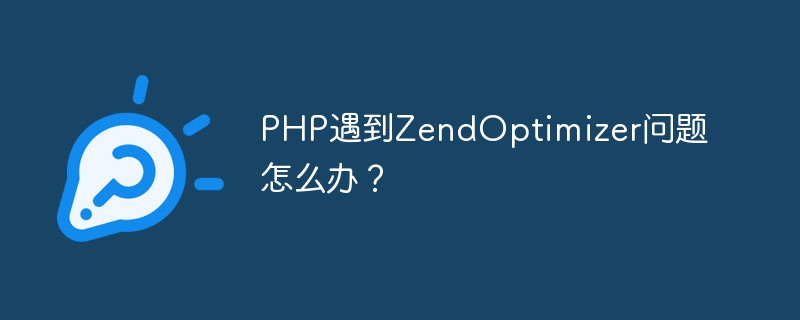Home >Backend Development >PHP Tutorial >What should I do if PHP encounters problems with ZendOptimizer?
What should I do if PHP encounters problems with ZendOptimizer?
- 王林Original
- 2024-03-20 09:15:04997browse

Title: What should I do if PHP encounters problems with ZendOptimizer?
During the development process using PHP, especially when deploying websites or applications, you sometimes encounter problems related to ZendOptimizer, which may affect the normal operation of the program. ZendOptimizer is an optimization interpreter for PHP that can improve the execution speed of PHP scripts, but sometimes some compatibility or configuration issues may occur. This article will introduce how to deal with problems when PHP encounters ZendOptimizer, and give specific code examples for reference.
1. Introduction to ZendOptimizer
ZendOptimizer is an optimization interpreter running on the PHP engine. It can improve the execution speed of PHP code, mainly by performing a series of optimization operations before the PHP code is executed. to achieve the purpose of improving performance. ZendOptimizer can also encrypt and decrypt PHP code to improve code security.
2. Reasons why PHP encounters problems with ZendOptimizer
- ZendOptimizer version is incompatible: PHP code may be developed on a certain version of ZendOptimizer, and an incompatible version is used during deployment version, causing the problem.
- PHP configuration problem: PHP configuration parameters do not match the requirements of ZendOptimizer, which may also cause problems.
- ZendOptimizer is not installed correctly: ZendOptimizer may not be installed or configured correctly, causing PHP to not run properly.
3. Methods to solve the problem of PHP encountering ZendOptimizer
- Check the ZendOptimizer version: Make sure that the ZendOptimizer version used in the deployment environment is consistent with that in the development environment.
- Check PHP configuration: Check the relevant configuration parameters in the php.ini file, especially the settings related to ZendOptimizer, to ensure that the configuration is correct.
- Reinstall ZendOptimizer: If you find that ZendOptimizer is not installed or configured correctly, you can try to reinstall ZendOptimizer.
- Debug code: By debugging PHP code, find out the code segments that may be incompatible with ZendOptimizer and modify or optimize them.
The following is a simple sample code that demonstrates ZendOptimizer problems that may be encountered in PHP code and gives solutions:
<?php
// PHP code example
function testZendOptimizerIssue() {
$data = "Hello ZendOptimizer!";
$encoded_data = base64_encode($data);
$decoded_data = base64_decode($encoded_data);
if ($data == $decoded_data) {
echo "ZendOptimizer compatibility test passed!";
} else {
echo "ZendOptimizer compatibility test failed!";
}
}
testZendOptimizerIssue();
?>In the above example code, we base64 encode and decode a string, and then determine whether the decoded string is the same as the original string. If you encounter problems with ZendOptimizer when deploying, you can try to check whether this code is incompatible with ZendOptimizer and debug and optimize it.
To sum up, when PHP encounters ZendOptimizer problems, it can be solved by checking the ZendOptimizer version, PHP configuration, reinstalling ZendOptimizer, and debugging the code. I hope the above content can help readers better deal with ZendOptimizer-related issues that may arise in PHP development.
The above is the detailed content of What should I do if PHP encounters problems with ZendOptimizer?. For more information, please follow other related articles on the PHP Chinese website!

